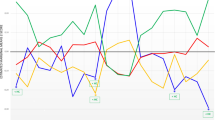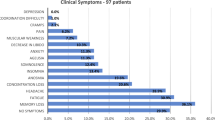Abstract
West Nile Virus (WNV) can be a neuroinvasive pathogen that may produce persistent mild-to-moderate neurocognitive impairments in some infected persons. Intra-individual variability (IIV) is an index of a person’s performance across a neuropsychological test or battery, which is an indicator of neurocognitive control and integrity of prefrontal systems. The present study examined possible associations of IIV to neurological health and well-being in WNV infection. Participants included 84 adults with a range of clinical WNV disease (31 West Nile Encephalitis, 16 West Nile Meningitis, 37 West Nile Fever) who completed the Repeatable Battery for the Assessment of Neuropsychological Status (RBANS). IIV was operationalized as covariance of variation (CoV), or the intra-individual standard deviation across 5 age-adjusted RBANS standard scores divided by the mean of standard scores. Participants were assessed for health-related quality of life (QoL) using the RAND 36-item short form health survey (SF-36). Analyses revealed that the West Nile Encephalitis group had higher neurocognitive CoV compared to the West Nile Fever group, and this difference was associated with a medium effect size (Cohen’s d = .52). Mixed linear models controlling for estimated IQ, activities of daily living, depression, neuroinvasive disease groups, and fatigue showed that higher RBANS CoV was associated with lower physical, but not mental health QoL. In persons with WNV infection, there is a modest association between elevations in IIV and encephalitis, and even subtle disruptions in neuropsychological functioning show relationships with important self-reported functioning as measured by physical health quality of life. Future studies should examine whether IIV predicts long-term health outcomes (e.g., mortality) in individuals infected with WNV.

Similar content being viewed by others
References
Bakula MA, Kovacević D, Sarilar M, et al (2011) Quality of life in people with physical disabilities. Coll Antropol 35(Suppl 2):247–253
Brandt J, Spencer M, Folstein M (1988) The telephone interview for cognitive status
Brewster P, Tuokko H, MacDonald S (2012) Inter-test variability contributes independently to the five-year prediction of Alzheimer’s disease in nondemented older adults. Alzheimers Dement 8:369. https://doi.org/10.1016/j.jalz.2012.05.1010
Brilla R, Block M, Geremia G, Wichter M (2004) Clinical and neuroradiologic features of 39 consecutive cases of West Nile Virus meningoencephalitis. J Neurol Sci 220:37–40. https://doi.org/10.1016/j.jns.2004.01.013
Burton CL, Strauss E, Hultsch DF, Moll A, Hunter MA (2006) Intraindividual variability as a marker of neurological dysfunction: a comparison of Alzheimer’s disease and Parkinson’s disease. J Clin Exp Neuropsychol 28:67–83. https://doi.org/10.1080/13803390490918318
Carson PJ, Borchardt SM, Custer B, Prince HE, Dunn-Williams J, Winkelman V, Tobler L, Biggerstaff BJ, Lanciotti R, Petersen LR, Busch MP (2012) Neuroinvasive disease and West Nile virus infection, North Dakota, USA, 1999-2008. Emerg Infect Dis 18:684–686. https://doi.org/10.3201/eid1804.111313
Carson PJ, Konewko P, Wold KS, Mariani P, Goli S, Bergloff P, Crosby RD (2006) Long-term clinical and neuropsychological outcomes of West Nile virus infection. Clin Infect Dis 43:723–730. https://doi.org/10.1086/506939
Centers for Disease Control and Prevention (2016) Final cumulative maps & data for 1999–2016. Retrieved from: www.cdc.gov/westnile/statsmaps/cumMapsData.html
Christensen H, MacKinnon AJ, Korten AE, Jorm AF, Henderson AS, Jacomb P (1999) Dispersion in cognitive ability as a function of age: a longitudinal study of an elderly community sample. Aging Neuropsychol Cognit 6:214–228
Cooley ME (1998) Quality of life in persons with non-small cell lung cancer: a concept analysis. Cancer Nurs 21:151–161
Elbers RG, Van Wegen EE, Verhoef J, Kwakkel G (2014) Impact of fatigue on health-related quality of life in patients with Parkinson’s disease: a prospective study. Clin Rehabil 28:300–311. https://doi.org/10.1177/0269215513503355
Garcia MN, Hause AM, Walker CM, Orange JS, Hasbun R, Murray KO (2014) Evaluation of prolonged fatigue post-West Nile virus infection and association of fatigue with elevated antiviral and proinflammatory cytokines. Viral Immunol 27(7):327–333. https://doi.org/10.1089/vim.2014.0035
Guarner J, Shieh W-J, Hunter S, Paddock CD, Morken T, Campbell GL, Marfin AA, Zaki SR (2004) Clinicopathologic study and laboratory diagnosis of 23 cases with West Nile virus encephalomyelitis. Hum Pathol 35:983–990
Haaland KY, Sadek J, Pergam S, Echevarria LA, Davis LE, Goade D, Harnar J, Nofchissey RA, Sewel CM, Ettestad P (2006) Mental status after West Nile virus infection. Emerg Infect Dis 12:1260–1262. https://doi.org/10.3201/eid1208.060097
Hasbun R, Garcia MN, Kellaway J, Baker L, Salazar L, Woods SP, Murray KO (2016) West Nile virus retinopathy and associations with long term neurological and neurocognitive sequelae. PLoS One 11:e0148898. https://doi.org/10.1371/journal.pone.0148898
Hilborn JV, Strauss E, Hultsch DF, Hunter MA (2009) Intraindividual variability across cognitive domains: investigation of dispersion levels and performance profiles in older adults. J Clin Exp Neuropsychol 31:412–424. https://doi.org/10.1080/13803390802232659
Hogan C, Wilkins E (2011) Neurological complications in HIV. Clin Med 11(6):571–575
Holtzer R, Verghese J, Wang C, Hall CB, Lipton RB (2008) Within-person across-neuropsychological test variability and incident dementia. JAMA 300:823–830. https://doi.org/10.1001/jama.300.7.823
Hultsch DF, MacDonald SWS, Dixon RA (2002) Variability in reaction time performance of younger and older adults. J Gerontol B Psychol Sci Soc Sci 57:P101–P115
Huybrechts KF, Caro JJ (2007) The Barthel Index and modified Rankin Scale as prognostic tools for long-term outcomes after stroke: a qualitative review of the literature. Curr Med Res Opin 23(7):1627–1636. https://doi.org/10.1185/030079907X210444
Jeha LE, Sila CA, Lederman RJ, Prayson RA, Isada CM, Gordon SM (2003) West Nile virus infection: a new acute paralytic illness. Neurology 61:55–59
Kleinschmidt-DeMasters BK, Marder BA, Levi ME, Laird SP, McNutt J, Escott EJ, Everson GT, Tyler KL (2004) Naturally acquired West Nile virus encephalomyelitis in transplant recipients: clinical, laboratory, diagnostic, and neuropathological features. Arch Neurol 61:1210–1220. https://doi.org/10.1001/archneur.61.8.1210
Kristman V, Manno M, Côté P (2004) Loss to follow-up in cohort studies: how much is too much? Eur J Epidemiol 19:751–760
McHorney CA, Ware JE, Raczek AE (1993) The MOS 36-Item Short-Form Health Survey (SF-36): II. Psychometric and clinical tests of validity in measuring physical and mental health constructs. Med Care 31:247–263
Morgan EE, Iudicello JE, Weber E, Duarte NA, Riggs PK, Delano-Wood L, Ellis R, Grant I, Woods SP, HIV Neurobehavioral Research Program (HNRP) Group (2012a) Synergistic effects of HIV infection and older age on daily functioning. J Acquir Immune Defic Syndr 61:341–348. https://doi.org/10.1097/QAI.0b013e31826bfc53
Morgan EE, Woods SP, Delano-Wood L, Bondi MW, Grant I, The HIV Neurobehavioral Research Program (HNRP) Group (2011) Intraindividual variability in HIV infection: evidence for greater neurocognitive dispersion in older HIV seropositive adults. Neuropsychology 25:645–654. https://doi.org/10.1037/a0023792
Morgan EE, Woods SP, Grant I, HIV Neurobehavioral Research Program (HNRP) Group (2012b) Intra-individual neurocognitive variability confers risk of dependence in activities of daily living among HIV-seropositive individuals without HIV-associated neurocognitive disorders. Arch Clin Neuropsychol 27:293–303. https://doi.org/10.1093/arclin/acs003
Morgan EE, Woods SP, Rooney A, Perry W, Grant I, Letendre SL, the HIV Neurobehavioral Research Pr (2012c) Intra-individual variability across neurocognitive domains in chronic hepatitis C infection: elevated dispersion is associated with serostatus and unemployment risk. Clin Neuropsychol 26:654–674. https://doi.org/10.1080/13854046.2012.680912
Murray KO, Garcia MN, Rahbar MH, Martinez D, Khuwaja SA, Arafat RR, Rossmann S (2014) Survival analysis, long-term outcomes, and percentage of recovery up to 8 years post-infection among the Houston West Nile virus cohort. PLoS One 9:e102953. https://doi.org/10.1371/journal.pone.0102953
Nolan MS, Hause AM, Murray KO (2012) Findings of long-term depression up to 8 years post infection from West Nile virus. J Clin Psychol 68:801–808. https://doi.org/10.1002/jclp.21871
Patel H, Sander B, Nelder MP (2015) Long-term sequelae of West Nile virus-related illness: a systematic review. Lancet Infect Dis 15:951–959. https://doi.org/10.1016/S1473-3099(15)00134-6
Pepperell C, Rau N, Krajden S, Kern R, Humar A, Mederski B, Simor A, Low DE, McGeer A, Mazzulli T, Burton J, Jaigobin C, Fearon M, Artsob H, Drebot MA, Halliday W, Brunton J (2003) West Nile virus infection in 2002: morbidity and mortality among patients admitted to hospital in southcentral Ontario. CMAJ 168:1399–1405
Petersen LR, Carson PJ, Biggerstaff BJ et al (2013a) Estimated cumulative incidence of West Nile virus infection in US adults, 1999-2010. Epidemiol Infect 141:591–595. https://doi.org/10.1017/S0950268812001070
Petersen LR, Brault AC, Nasci RS (2013b) West Nile virus: review of the literature. JAMA 310:308–315. https://doi.org/10.1001/jama.2013.8042
Randolph C, Tierney MC, Mohr E, Chase TN (1998) The Repeatable Battery for the Assessment of Neuropsychological Status (RBANS): preliminary clinical validity. J Clin Exp Neuropsychol 20:310–319. https://doi.org/10.1076/jcen.20.3.310.823
Sadek JR, Pergam SA, Harrington JA, Echevarria LA, Davis LE, Goade D, Harnar JA, Nofchissey RA, Sewell CM, Ettestad P, Haaland KY (2010) Persistent neuropsychological impairment associated with West Nile virus infection. J Clin Exp Neuropsychol 32:81–87. https://doi.org/10.1080/13803390902881918
Samaan Z, McDermid Vaz S, Bawor M, Potter TH, Eskandarian S, Loeb M (2016) Neuropsychological impact of West Nile virus infection: an extensive neuropsychiatric assessment of 49 cases in Canada. PLoS One 11:e0158364. https://doi.org/10.1371/journal.pone.0158364
Sejvar JJ, Curns AT, Welburg L, Jones JF, Lundgren LM, Capuron L, Pape J, Reeves WC, Campbell GL (2008) Neurocognitive and functional outcomes in persons recovering from West Nile virus illness. J Neuropsychol 2:477–499
Shafer AB (2006) Meta-analysis of the factor structures of four depression questionnaires: Beck, CES-D, Hamilton, and Zung. J Clin Psychol 62(1):123–146. https://doi.org/10.1002/jclp.20213
Trépanier LL, Rourke SB, Bayoumi AM, Halman MH, Krzyzanowski S, Power C (2005) The impact of neuropsychological impairment and depression on health-related quality of life in HIV-infection. J Clin Exp Neuropsychol 27:1–15. https://doi.org/10.1080/138033990513546
Tyler KL, Pape J, Goody RJ, Corkill M, Kleinschmidt-DeMasters BK (2006) CSF findings in 250 patients with serologically confirmed West Nile virus meningitis and encephalitis. Neurology 66:361–365. https://doi.org/10.1212/01.wnl.0000195890.70898.1f
Vaughan L, Leng I, Dagenbach D, Resnick SM, Rapp SR, Jennings JM, Brunner RL, Simpson SL, Beavers DP, Coker LH, Gaussoin SA, Sink KM, Espeland MA (2013) Intraindividual variability in domain-specific cognition and risk of mild cognitive impairment and dementia. Curr Gerontol Geriatr Res 2013:495793–495710. https://doi.org/10.1155/2013/495793
Ware JE, Sherbourne CD (1992) The MOS 36-item short-form health survey (SF-36). I. Conceptual framework and item selection. Med Care 30:473–483
Weatherhead JE, Miller VE, Garcia MN et al (2015) Long-term neurological outcomes in West Nile virus-infected patients: an observational study. Am J Trop Med Hyg 92:1006–1012. https://doi.org/10.4269/ajtmh.14-0616
Wechsler D (2011) Wechsler Abbreviated Scale of Intelligence, 2nd edn. Psychological Corporation, San Antonio
Acknowledgements
The authors would like to thank all of the study participants for contributing their time and efforts to this study.
Funding
This study was supported National Institutes of Health/National Institute of Allergy and Infectious Diseases (NIH/NIAID 1R01AI091816-01) and by the Gillson Longenbaugh Foundation.
Author information
Authors and Affiliations
Corresponding author
Ethics declarations
Conflict of interest
The authors, David P. Sheppard, Steven Paul Woods, Rodrigo Hasbun, Lucrecia Salazar, Melissa S. Nolan, & Kristy O. Murray, declare that they have no conflict of interest.
Rights and permissions
About this article
Cite this article
Sheppard, D.P., Woods, S.P., Hasbun, R. et al. Does intra-individual neurocognitive variability relate to neuroinvasive disease and quality of life in West Nile Virus?. J. Neurovirol. 24, 506–513 (2018). https://doi.org/10.1007/s13365-018-0641-5
Received:
Revised:
Accepted:
Published:
Issue Date:
DOI: https://doi.org/10.1007/s13365-018-0641-5




